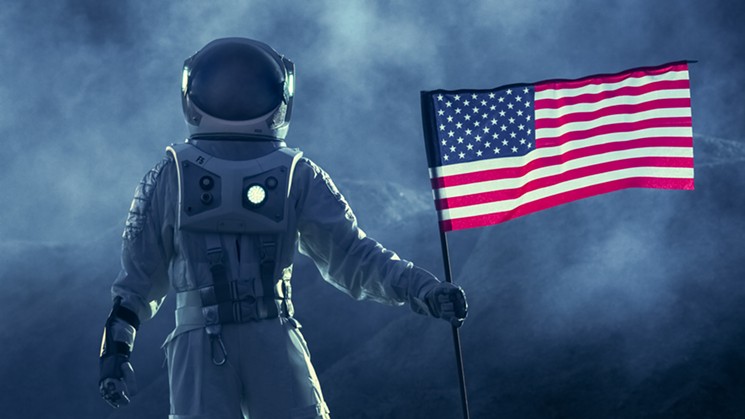How do astronauts cast their votes floating over 200 miles above the Earth’s surface? All thanks to the special absentee ballot system. Let’s see how US astronauts will be able to exercise their civic duty in the coming presidential elections in November.
NASA astronaut Kate Rubins, who will be aboard the International Space Station (ISS) on the day of the US presidential elections, plans to cast her vote from space – more than 200 miles above the Earth’s surface. Rubins is currently stationed in star city, Russia, preparing with two other cosmonauts for a mid-October launch and a six-month stay at the International Space Station.
The American scientists will be able to cast their vote via a special absentee ballot system. Voting from the space station is similar to voting absentee from anyplace on the planet, except instead of relying on the US postal service to deliver the ballot. Rubins and the two other astronauts will cast their votes electronically from Mission Control in Houston.
“I think it’s really important for everybody to vote,” said Rubins. “If we can do it from space, then I believe folks can do it from the ground, too.” She said, “she won’t let a little thing like low-earth orbit stop her from exercising her right to vote. It’s critical to participate in our democracy, we consider it an honour to be able to vote from space.”
Voting from space: How is this possible?
Since 1997, American astronauts have had the ability to vote from space. A bill passed by the Texas state legislature established the technical voting process for astronauts. The bill allowed all the astronauts who live in Texas to vote remotely from space. In the last 23 years since the bill cleared, many long-term visitors to the cosmos have voted from space.
According to a blog post published by NASA, the voting process starts a year before the launch, when the astronauts are supposed to select which elections (local/state/federal) they want to take part in while in space. Following this, six months before the elections, astronauts are provided with a standard form called the “Voter Registration and Absentee Ballot Request – Federal Post Card Application”.
Once that card is sent and they are approved, the county clerk’s office in the astronaut’s earthly hometown has special instructions to send their space-bound citizen an electronic ballot via mission control. The astronaut then uses a password protected link to complete their electronic ballot and sends it back to mission control, which forwards it back to the county clerk for the official count. To preserve privacy, only the astronaut and the clerk have the password to access the ballot.
For the astronaut, the process is a slightly more high-tech version of filling out an absentee ballot but amounts to the same effort an at-home citizen takes to cast an Earth vote. As Kate Rubins had planned her voting a few months before the presidential elections, her post card application is already in, and she’s good to go for the November election.
Many astronauts in past have voted from space:
It has been noted that celestial votes have been cast in almost every election cycle in the US. Defying earthly bounds doesn’t stop many astronauts from exercising their civic duties. This exercise of casting the vote in elections was done in order to maintain the rights of the astronauts as US citizens from the International Space Station.
David Wolf became the first astronaut to vote from space while he was aboard the Russian Mir Space Station. In 2004, Leroy Chiao voted from space. Michael Lopez-Alegria did it in 2006, and Greg Chamitoff and Mike Fincke followed their civic duty in 2008. In 2010, astronauts Doug Wheelock, Shannon Walker, and Scott Kelly voted from the International Space Station.
In the 2016 presidential elections, astronauts Edward Michael Fincke and Greg Chamitoff, who were living and working onboard the ISS, cast their votes by accessing a secure secret ballot.
Is it legal to vote from space?
A new law was born in Texas in 1997 when astronaut John Blaha expressed his disappointment of not being able to cast a vote in the 1996 presidential race between President Bill Clinton and Bob Dole. At the time, Blaha was serving on Russia’s Mir Space Station, a predecessor to the ISS.
It was therefore, Texas lawmakers passed a bill that provided the astronauts to cast their vote in space. The then Governor, George Walker Bush signed it into the law. Till now, only American astronauts can vote from outer space. The State of Texas passed a law that allows only American astronauts to cast their ballots from outer space, from the International Space Station (ISS).
A question arises here: Why only the State of Texas implemented such a law? The reason is really simple that most of the American astronauts are living in the State of Texas, they usually live near the Johnson Space Centre (JSC) in Houston. The voting process was necessitated due to the beginning of long-duration spaceflight for American astronauts.

